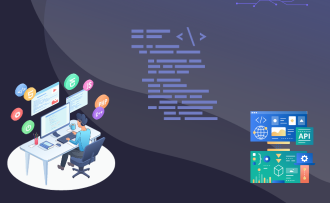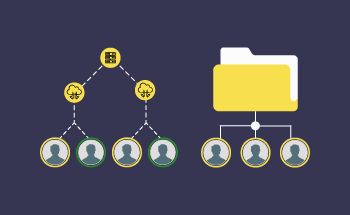What’s the difference between Docker and Kubernetes
12:45, 15.02.2022
Let’s see what the difference between virtual machines and containers is, why Docker is so popular, what Kubernetes is, and what are the main IT-market trends in this area. Both technologies are a method of virtualization and are used for application deployment, but there are a few fundamental differences between them which you will discover once you have deeply analyzed and compared them. Let’s see.
Docker: What is it and how does it work?
Docker is a software platform used for the development, deployment, and launching of apps in the form of portable and independent containers, able to function in the cloud or on-premises. This platform allows the launching of multiple independent containers on one server or hosting, sharing the kernel space with the host.
The containers function on the OS kernel installed by the hosting provider, the isolation of the user environment is performed on the OS level. That’s the fundamental difference from Hardware virtualization methods. Talking about Docker, you should understand that this platforms’ specificity is optimal for deploying one app in one container. The OS resources are used for containerization – in the case of Linux, these are cgroups and namespace. That’s where all advantages and disadvantages of Docker as a virtualization method come from.
Docker’s advantages
- The containers suit perfectly for deploying separate apps with all their dependencies, libraries, and configuration files. This makes moving apps between infrastructures much easier. To put it in a nutshell, an app, deployed in a Docker container, is an independent local infrastructure that can be moved from the development system to the testing environment, and later to the productive environment. The developers won’t have to worry about dependencies since this container contains everything needed for the app to work.
- Easy migration. The logical consequence of the previous paragraph – a migrated container doesn’t have to be set up again after moving on to a new instance.
- Processes, occurring in the containers, do not affect the main operating system, providing a higher level of security. Again, Docker containers eliminate the possibility that deployed applications during testing will somehow negatively affect the work of the kernel.
- Facilitating and automatization. The process of app automation in the containers may be fully automated, preventing the human factor from affecting the system kernel’s work negatively.
- Docker containers fit perfectly for microservice architecture – this is a variant of development organization where the app is divided into several separate and independent components. In comparison to monolith architecture where all the parts of the system depend heavily on each other, microservice architecture facilitates the work on the extension of apps’ functional capacities, because, making changes in the work of certain components, you don’t risk breaking the others depending on them.
- You don’t need to configure the environment for launching – it is provided together with the app.
Docker containers have been spread so widely because they allow to deploy and test apps separately. This platform is often used by specialists, developing protection mechanisms against viruses, masking programs, worms, trojans, screen lockers, and other malware. When running this kind of software in a container, you don’t risk damaging the main operating system and other containers, running on the same hosting.
API Docker disadvantages
Firstly, if you need to update the runtime of the language or the compilator version in the old container, this may cause a mass of random and unconnected problems to the point that the developers will have to manually change everything for more up-to-date analogs.
Secondly, there is a point noted by many system administrators with extensive experience – limited backward compatibility in certain directions which may cause certain problems in development and testing. For example, images, created by a newer version of docker-daemon may refuse to work on older docker-daemons. And if you have an extensive server park with numerous containers on different versions of the platform, this may become a problem.
The third point is that docker does not allow you to configure the order in which the containers are loaded. Yes, you can compensate for this with third-party tools but it can't be called convenient.
Lastly, Docker doesn’t provide 100% isolation of containers from each other in terms of resource consumption. Because of this, if there are numerous containers on the hosting, there may be contention for IOPS, cash-memory of the processor, RAM, etc. between them. As a result, you can face a significant decrease in performance on dedicated servers.
Kubernetes – What is this?
Kubernetes is open-source software that is used for orchestrating apps in containers. To put it simply Kubernetes allows automatizing, deployment, extension, and coordination of software on a cluster.
This orchestrator has been developed by Google and is broadly used today to work with all containerizations systems with Container Runtime Interface support, including Docker.
It’s important to understand that Kubernetes is not opposed to Docker, these are absolutely different technologies that often complement each other. Docker is a container platform, whereas Kubernetes is an orchestrating tool, which is used for managing all nodes and automatization of all key processes, beginning with from rolling out updates to load balancing and traffic routing. In some way Kubernetes compensated Docker’s disadvantages, making the work with containers much more convenient and safe.
How does Kubernetes work?
Container orchestrator Kubernetes consists of a few components that perform certain functions:
- API-server, used for horizontal scaling, is the main component.
- Etcd – responsible for storing data in the key-value format.
- Kube-scheduler – a component of the control plane.
- Kube-controller-manager – runs the processes of the controller.
- Cloud-controller-manager – runs the cycles of the controller.
These are only basic components, listed for the basic understanding of how orchestrator works. These components don’t affect each other’s work, they work according to the pull model. And if something happens to one of the components, this won’t affect the work of the rest.
Kubernetes is a portable extensible platform, perfect for building platforms of the commercial scale. The tool is equipped with all necessary mechanisms for managing the containerized apps and services. This orchestrator facilitates automatization and the declarative PO setup.
Application of Kubernetes together with Docker or other containerization systems provides the following additional possibilities:
- Monitoring of services and load balancing between containers – that’s exactly what we talked about in the paragraph about Docker’s disadvantages.
- Storage orchestration.
- Automatization of updates and rolling containers back to previous versions if necessary. Significantly facilitates the development, saves time and money of the IT-company.
- Automatizations of such tasks as restarting failed containers and finishing those not performing the functions assigned by the developer.
- Providing privacy through password management tools, SSH-keys and OAuth-tokens.
This platform contains all necessary components for providing orchestration with centralized control on every stage. If you have a small number of containers, you don’t need such a tool, the basic functions and capacities of Docker are enough. But if tens or even hundreds of containers are located on your hosting, Kubernetes deployment makes sense and is even sometimes necessary.
That’s all for now. We’ve tried to give the most detailed answer to the question, what the difference between Docker and Kubernetes is. Thank you for your attention.


